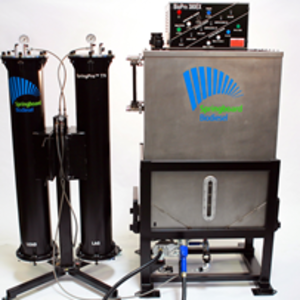US military base in Afghanistan to make biodiesel from UCO

Photo: Springboard Biodiesel
March 25, 2015
BY Springboard Biodiesel
Springboard Biodiesel announced March 25 that it has been selected to provide its turn-key, small-scale biodiesel processing system to Bagram Airfield in the Parwan Province of Afghanistan.
Springboard Biodiesel’s BioPro 380EX and SpringPro T76 comprise a small-scale biodiesel processing system designed to inexpensively convert the base’s used cooking oil (UCO) into ASTM-grade biodiesel that can then be used in diesel vehicles on base.
“Springboard is excited to provide this made-in-the-USA, clean technology solution to the U.S. military,” said Springboard Biodiesel CEO Mark Roberts. “In Afghanistan, the fully burdened cost of diesel fuel is extremely high. We’ve heard estimates north of $10 per gallon. The BioPro systems made by Springboard will enable the base to produce high-quality biodiesel fuel for less than $1 per gallon—not to mention, biodiesel made from used cooking oil burns up to 90 percent cleaner than regular diesel.”
Springboard Biodiesel has worked with a large number of institutions that have access to UCO. “We refer to these groups as ‘Captive Kitchens,’” Roberts said, “meaning that as a natural consequence of their mission, they cook for large groups of people—schools, restaurants, hotels, prisons, casinos and, of course, military bases, where there is the added element of fuel security. Making a cleaner-burning fuel, safely and inexpensively on-site, gives these groups a huge advantage. We’re hopeful that the success of Bagram’s small-scale biodiesel production initiative will resonate with other bases that want to copy the model.”
Advertisement
Springboard Biodiesel has been building automated, small-scale biodiesel production systems since 2008 and has more than 1,000 of its systems operating in all 50 states and now in 24 countries. The company estimates that the cumulative biodiesel production capacity enabled by its systems surpasses 7.5 MMgy, which results in a CO2 emissions reduction of approximately145 million pounds annually.
Advertisement
Related Stories
The USDA significantly increased its estimate for 2025-’26 soybean oil use in biofuel production in its latest World Agricultural Supply and Demand Estimates report, released July 11. The outlook for soybean production was revised down.
U.S. fuel ethanol capacity fell slightly in April, while biodiesel and renewable diesel capacity held steady, according to data released by the U.S. EIA on June 30. Feedstock consumption was down when compared to the previous month.
The U.S. EPA on July 8 hosted virtual public hearing to gather input on the agency’s recently released proposed rule to set 2026 and 2027 RFS RVOs. Members of the biofuel industry were among those to offer testimony during the event.
The USDA’s Risk Management Agency is implementing multiple changes to the Camelina pilot insurance program for the 2026 and succeeding crop years. The changes will expand coverage options and provide greater flexibility for producers.
The USDA’s National Agricultural Statistics Service on June 30 released its annual Acreage report, estimating that 83.4 million acres of soybeans have been planted in the U.S. this year, down 4% when compared to 2024.
Upcoming Events










